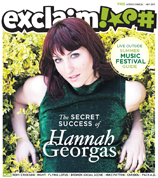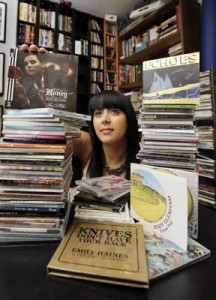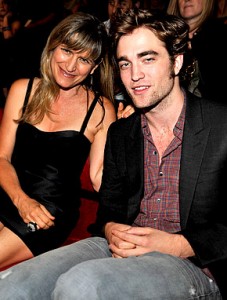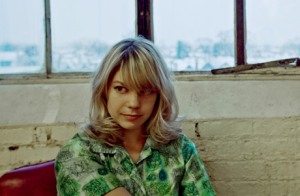As featured on the cover of the May 2010 Exclaim! Magazine.
By Amanda Ash
“It’s a really great feeling to know people want to hear my opinion and my advice on music. It’s an honour,” Hannah Georgas says demurely, detailing her current position as a mentor and expert in a local music program. “It’s amazing to sit on the other end and be like, ‘Wow, I did this songwriting competition like a year ago.’ It’s pretty fucking sweet.”
Georgas is grinning like a kid who’s just won her grade-two spelling bee. For a fledgling artist with only a six-song EP to her name, the 26-year-old still can’t believe how far she’s come. As Georgas sips her Americano, bashfully noting how she’s morphed into a singing-songwriting wizard in the eyes of her Vancouver-based counterparts, her caution slowly turns to pride. And who can blame her? After all, she’s got musical stats that could sucker punch much more “established” Canadian indie bands.
Since deciding to seriously pursue music three years ago, her resume has exploded, chock-full of television song placements, a Taylor Swift shout-out and a Wal-Mart commercial commission. Between her EP The Beat Stuff and this month’s debut full-length This Is Good, Georgas’s songs have been heard on shows like Heroes, Degrassi–The Next Generation, Flashpoint andPeak Season. She won the 2009 CBC Radio 3 Bucky Award for “Best New Artist.” Starbucks has licensed “The Beat Stuff” to play in its North American stores. And love-struck critics everywhere are crowning her the next Feist.
In short, she’s managed to become one of the most successful Canadian musicians you’ve probably never heard of.
It won’t be long before Georgas becomes a household name. Even as I sit across from the fiery-haired singer-songwriter at Vancouver’s Our Town Café, a local booking manager spots her, not just tucked in the corner but hidden behind an oversized pillar that also serves as a rambunctious air vent. Later that night at an overcrowded Jason Collett/Zeus/Bahamas show, a friend points out a black hooded figure standing in the shadows: “Oh, there’s Hannah Georgas.”
For those who have kept tabs on her, we can agree the talented songstress has had a meteoric rise in exposure and acclaim with very little back catalogue. She didn’t get in on sparkle or image; she’s doing it all on good tunes. A quick-witted and warm conversationalist, Georgas isn’t just a new artist gliding on good luck, but someone wholly devoted to unembellished melodies.
“I write because it’s an honest thing,” Georgas says about her process. “I get inspired to write when I’m feeling something and that’s what comes out. There’s honesty in my music. Music that inspires me is music that I can emotionally connect to. Not even just the lyrics, but the feeling of the song itself. Whenever I feel like I just want to fist pump a song” ― Georgas bites her lower lip and jabs the air above her ― “that’s what inspires me. When I hear a song and am like, ‘Ohhh yeah,’ that’s the music I try to make so people can have that same connection. So hopefully I’m doing something like that. Fist-pumping music.”
Although “Bang Bang You’re Dead” ― with its adorable pre-pubescent gang vocals and upbeat, 8-bit intro ― is the first single off of This Is Good, “Thick Skin” is the first video from the album. Directed and inspired by Sean Wainsteim (Wintersleep, Tokyo Police Club, Born Ruffians), the video was released in January, and features Georgas completely naked, crawling through mud and tunnels. The video involved 300 takes, bruised knees and mud in crevices she didn’t know existed, but according to Georgas, it was well worth the mess. Some may question her motivation for producing such a racy piece as easy publicity, but she maintains Wainsteim’s vision worked to define her as more than just a singer-songwriter in a sea of them.
“I think it was a really cool way of introducing me ― like, ‘okay, here’s Hannah Georgas!'” she exclaims. “It was kind of ballsy. I just wanted it to show the rawness to who I am. It’s all of me, in this video, and it’s a very honest way of showing who I am. Some of the responses [to the video] were like ‘Hot! Sexy video’ but it’s not intended to be that at all. It’s a progression to my other songs, different from what people have heard before, and takes this interesting route where there’s a little bit more to Hannah than just these folk songs. There’s something darker.”
Despite her obvious talent and daring disposition, Georgas was once reluctant to embrace music as a career. She had the love, but never felt she could make a go of an iffy profession that wouldn’t necessarily (and likely would not) end in a comfortable lifestyle and a white picket fence. “I was always battling it,” Georgas confesses. “Since I was five I’ve known I’d love to play music, but never really felt I could just put it out there. It was in the back of my mind that my parents don’t agree with what I’m doing. My dad was super passionate about music, but he chose the road of raising a family and just wanted us to, no matter what, have food on the table and make a good living. My parents struggled with financial stuff. My mom was like, ‘If you decide to do music we’re not going to be able to support you.’ But once things started to happen it was like, ‘Oh, okay, she’s working hard for this and not just jammin’ in a band. She’s being serious and things are happening for her.'”
Georgas’ battle of the beats began in her hometown of Newmarket, Ontario when she was five. She took up the piano at her parents’ request, and by the age of six, wrote her first song. “I’m not singing it for you!” she bursts after admitting she still remembers the tune, her cheeks turning a dusty pink. However, she does ruefully confess its lyrical content. “It’s just me singing about how I have a talent … and I should use it wisely … and share it with a friend,” she laughs.
Come high school, Georgas added a little sass to her saccharine demeanour and joined a pop-punk band called Sister Satellite with current Arkells drummer Tim Oxford. The group saw moderate success, including being named the house band for the Toronto Rock lacrosse team. “Recently, I played in Hamilton and the Arkells’ lead singer [Max Kerman] came up to me and said, ‘Your old drummer plays with me. Tim Oxford. He plays with me,'” explains Georgas. “I was like ‘Who? Tim?!’ Now we’ve reunited and laughed about playing together. He was like 15 when we played together. It’s so crazy.”
Newmarket grew stale for Georgas. At age 20, she left Sister Satellite, packed up and pursued university life in Victoria, BC, yet found herself gravitating back to music. She discovered that co-worker and fellow musician Jean-Paul Maurice ran a studio in a friend’s garage. The cold, makeshift space belonged to Aidan Knight, a Victoria singer-songwriter who has recently turned heads with his full-length release Versicolour. After hearing Georgas’ rough cuts, Knight was eager to help record a few demos. “My first impression was everyone’s first impression: She has a great voice,” Knight says. “I wouldn’t say she’s particularly shy, but she’s not like this Amazon who walks down Commercial Drive and is seven feet tall with piercing reptilian eyes. She’s a normal person who rides a mountain bike. When you see someone have that chameleon-like transformation on stage when she puts on her shiny dress and does five or six high kicks, you’re like ‘Yeah, that’s so awesome.'”
Georgas’ glittery Emily Haines-esque live shows are one of the many reasons the talented chanteuse has taken off at mach speed, especially when you throw in a knack for penning addictive pop tunes. “[After recording with Maurice and Knight] I was like, ‘I don’t want to make any more excuses.’ I just wanted to give it a go with my stuff and see how it goes. I clearly kept going down this path that I felt was really unhappy most of the time. I felt more and more sure [of music] as I went along. I was like, ‘What are you doing? You only live life once. Do what you want to do. Do what makes you happy, or you’re going to be miserable.’ So I just said, ‘Fuck it’ and came [to Vancouver] and did everything I could to just get myself out there and meet people and find a scene.”
Georgas’ Myspace demos caught the ears of singularly named Vancouver producer Winston. He contacted Georgas and offered to record another set of demos, as well as her EP The Beat Stuff. His timing was superb. After hearing about the 2008 Music BC Songbird West Singer/Songwriter Competition, Georgas entered “The Beat Stuff” and won.
She approached Mother Mother’s Ryan Guldemond and Vancouver producer Howard Redekopp to record This Is Good during the spring of 2009. “[Production] went swimmingly,” Guldemond says over the phone. “It’s hard to say that about most records you make. Even if they turn out the way you want, it can be a real struggle to come to fruition. It was like clockwork. It’s a nice feeling to arrive exactly where you intended on going.”
Guldemond affirms the recording process never floundered, even though Georgas’ personal life took a downward turn in the middle of making the record. “My dad died and that was challenging for me, to really take some time from the work,” Georgas says. “My head was all like ‘Record, record.’ I literally got a call from home, being like ‘He just died.’ It was really challenging to be like, ‘It’s not about the record, it’s about your dad,’ and leaving everything and going back to deal with it.”
“She’s pretty grounded,” Guldemond says of Georgas at the time. “If anything, she brought something positive out of [her father’s death] and fuelled it into the album, which is pretty commendable.”
Things started looking up again in June 2009. Georgas flew out to New York to play a gig, which was met by no more than ten people. One of them was a Wal-Mart talent scout. He asked Georgas if she wanted to write a jingle for an upcoming commercial and she jumped on the opportunity.
Upon returning to Vancouver, Georgas roped Guldemond into adding the Wal-Mart project to his plate. They wrote the jingle in seven hours, gave it to the Wal-Mart honchos and that was that. The song “You’ve Got A Place Called Home” ran in their back-to-school commercial for eight weeks in North America. “People were asking where they could find this song. And I was like, ‘Whaaa?'” Georgas laughs “Taylor Swift even tweeted that the Wal-Mart commercial made her cry. It’s about a mom who’s getting her daughter’s dorm ready for college and she’s saying goodbye with the song in the background.” After the Wal-Mart commercial came out, Georgas put her newfound recognition towards a good cause. Any sales of The Beat Stuff EP had a portion donated to research juvenile diabetes in honour of her father, who died from the disease.
Georgas’ honest heart and genuine spirit shine through her philanthropic efforts as This Is Good. Backed by a few hired guns and a couple of long-time friends, each of her 11 songs is like colourful cocktail that blends distilled emotion with grounded perspective. The majority of tracks were written in the past two years, the subject matter crawling out from the personal craters in her life. Her songs embody everything from sour relationships and unimaginable loss to pet peeves and carefree desire. If there’s an overarching album concept, it’s “Hannah Georgas versus life.” “I’ve been a machine for writing recently. I’ve found I’ve always got something crazy on my mind, and it’ll just come out in my music,” she laughs.
Georgas says she’s happy to finally have more than six songs to offer her fans. More importantly, This Is Good proves Georgas has indeed chosen the right path. As her frank album title suggests, where she’s at right now is ― and may very well remain ― good. “You love it; you’re good at it; and you’re going to work hard to get it: those three things are important,” Georgas says. “If you don’t have those three things in line, sorry, you’re not going to get it. As long as I’m working hard and putting my full effort into [music], it’s going to be okay.”





 Megan Stewart (‘10) is writing for CTV’s website, while Lara Howsam (‘11) is working on the CTV nightly newscast and focusing on the cultural elements of the games.
Megan Stewart (‘10) is writing for CTV’s website, while Lara Howsam (‘11) is working on the CTV nightly newscast and focusing on the cultural elements of the games.
 Basia Bulat
Basia Bulat

